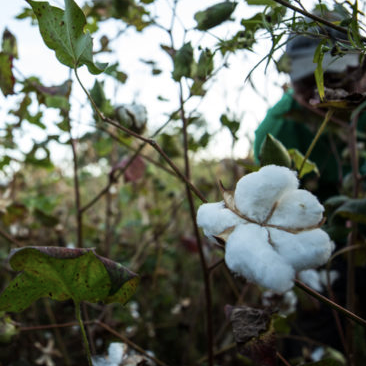Benefits of Agroecology on Farmers in Brazil

Reading stories of farmers exploring different ways of growing crops using more sustainable techniques for the land and themselves and seeing positive results is what we are here for:
"Amaral was one of the first people in the region to turn to agroecology after the farmed passed into his hands. Agroecology is a sustainable farming approach that works in harmony with nature, unlike industrial agriculture. Amaral had four main reasons for going this route: to enrich the local culture; to ensure food security; to generate income; and to be able to eat food that’s “clean and free of poison”.
In 2019, Amaral was contacted by representatives from the Institute for Society, Population and Nature (ISPN), an NGO that was holding workshops in the region training local farmers in agroecology. Amaral’s family, one of 46 that subsequently joined the ISPN’s Sustainable Cerrado Cotton project, planted their first crop in February 2020.
“We didn’t harvest even 200 kilos [440 pounds] in the first year,” Amaral says. “But this year was really good — over 800 kilos [1,760 lbs].” This year, the farms in the region gathered more than 5 metric tons of cotton in their second harvest....
Green fertilization and crop mixing
Antonio Marcos, who runs a local cooperative, convinced the farmers to dedicate just 1 hectare (2.5 acres) of their land to the project. He guided them through the four fundamental stages: planning and soil preparation, planting, care, and harvest.
Within this single hectare of land, Marcos taught them, 50% of the area should be planted with cotton in strips up to 1 meter (3 feet) wide, lined with strips of secondary and tertiary crops. Secondary crops include sesame and other food crops, while tertiary ones, chosen by each farmer, include pumpkin, watermelon, corn, turmeric and other fruits and vegetables.
The farmers are taught to use non-industrial products throughout the entire farming process. Animal manure and organic compost serve as fertilizer, and limestone, rock dust and rock phosphate in place of industrial alkalis for liming. For pest control, they eschew insecticides and instead invest in crop diversification and manual capture techniques.
“In some places, the cotton is over a meter high,” says Haroldo Mendes Barbosa, who has farmed the same plot of land since 1996. He says he never treated his soil until he started participating in the sustainable cotton project. “I think the real advantage was the green fertilization we did on the soil. It has to be strong for the plants to be strong.”
Guarantee of food security
The Sustainable Cerrado Cotton project unfolded largely during the COVID-19 crisis. “The pandemic played an important role in this story,” says Jessica Pedreira, a technical adviser for the ISPN. “People were losing income and experiencing hunger, and the project helped generate income and food security.”
While cotton productivity tripled over the nearly two years that the farmers have been practicing agroecology, food crops increased by just as much or even more. On some farms, saffron yields were up to seven times higher.
“One of our pumpkins weighed over 13 kilos [29 lbs],” says farmer Josefino Ferreira dos Santos. “It was so beautiful I could barely keep my eyes off it.”
Barbosa says the gains in cotton production aren’t the most important thing about this project. He says the main benefit is having more food crops available, all grown “without poison.” Rotating crops improves soil quality over the medium term. “The earth has to be alive — there’s no other way,” he says. “We have to leave soil better than we found it.”
Cotton spinning revival
Amaral and Barbosa share a childhood memory: The sound of spinning wheels. Cotton spinning is a local tradition here that was lost over time due to a number of reasons, including fewer cotton producers, the industrialization of the textile industry, and poor-quality cotton. Cotton grown in monoculture plantations in other states, using chemical fertilizers and pesticides, trigger allergies for the spinners.
Today, the spinners work with pesticide-free cotton and take pride in the products grown on their own land. Diva Maria dos Santos proudly tells of having spun the yarn to make the clothing and linens in her wedding trousseau with her own hands. She learned the trade from her mother and today is teaching her 14-year-old daughter to spin. “I want her to learn to spin because there will be a day when there’s too much work for me,” she says. “She likes to do it. She will keep the tradition going.”
Read the full article here:
https://news.mongabay.com/2022/01/farmers-in-brazils-cerrado-cotton-on-to-the-benefits-of-agroecology/